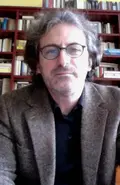Western Traditionalism/Perennialism and its Influence on Orthodox Christianity
Duration
05/2017
- 04/2020
Funding
Fritz Thyssen Stiftung :
141 400 Euro
Duration
05/2017
- 04/2020
Funding
Fritz Thyssen Stiftung :
70 000 Euro
Project management

The research project aims to undertake a comparative analysis of the reflection on the position of Orthodox Christianity in modernity and with regard to religious pluralism, which is called "Orthodox Perennialism". The latter represents an orthodox reception of certain Western esoteric approaches to an "eternal philosophy" ("philosophia perennis") in various religions and is an attempt to rethink and articulate the spiritual and religious contours of the Orthodox presence in modernity. The main focus is on two authors who have represented these positions: the British Hellenist, philosopher and Orthodox convert Philip Sherrard (1922-1995) and the Orthodox Romanian priest-monk and theologian André Scrima (1925-2000).
The articulation of a theory on the diversity of religions and their assumed metaphysical unity within the framework of a critical diagnosis of the problems of materialistic, greedy and secular modernity goes back to the French philosopher René Guénon (1886-1951), who postulated a common inner, eternal and primordial core - "tradition" - behind all historical religions. The latter could - according to Guénon - show the way out of the numerous problems and dead ends of Western modernity and be regarded as the solution. But the access to that esoteric "tradition" was only possible as consequence of an initiation ritual, the form of which differed from religion to religion. The line of thought that emerged from this became known in research as "perennialism" or also "traditionalism", the cornerstones of which are: the search for the lasting core and essence behind all religious phenomena, the diagnosis of an acute crisis of the modern Western world, the postulation of this esoteric religious tradition as a way out of this crisis, the initiation-determined access to this tradition, and the abandonment of a "spiritual hermeneutics" to a new orientation in life.
The specifically orthodox appropriation of such perennialistic/traditionalistic ideas has been undertaken at various levels. In the case of P. Sherrard this was connected with a similar orthodox anti-occidentalism, in which the cause of the crisis of the modern world received a historical-theological explanation, in particular through the excessive legitimization of reason as epistemic authority in the West, the one-sided rationalization of faith since medieval scholasticism, the emphasis on a worldly orientation and the development of technology, which destroyed the sacredness of creation and led to the modern deep ecological crisis. With A. Scrima the appropriation of Western perennialism was connected with an ecumenical opening of the Orthodox tradition; e.g. he saw similarities between the perennialistic initiation rituals and the Christian sacraments. His aim was the articulation of a "spiritual hermeneutics" as an explanatory approach and instrument of the religious life of humanity. Later, Scrima distanced himself from Guénon's crisis rhetoric and cultural pessimism.
The reception of perennialist, esoteric ideas represents a special chapter in the religious and cultural relations between Eastern and Western Europe and illustrates their manifold interferences in the field of religious ideas and cultural developments. It also shows how Orthodox theology has tried to position itself in the modern age, what changes have been made in the process and how important Orthodox orientations (e.g. the emphasis on authentic Christian tradition) have been newly articulated in this context.
The theoretical framework of the research project is on the one hand determined by the current discussions about the "exploration of Western esotericism". On the other hand, Prof. Makrides also sees the project as a contribution to the cultural history of Orthodox Christianity from the perspective of religious studies.
